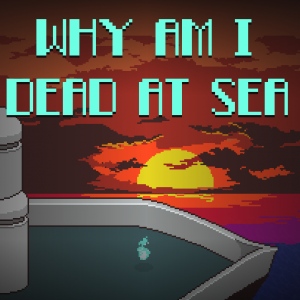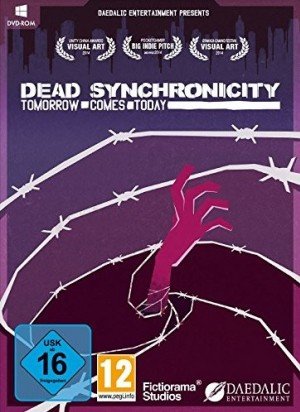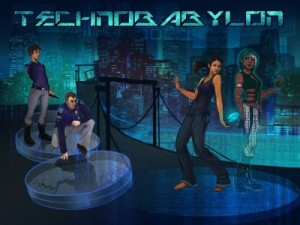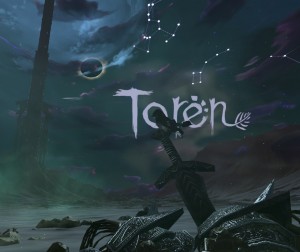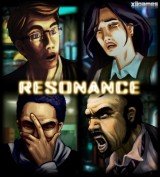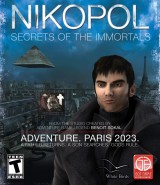Review for Why Am I Dead at Sea
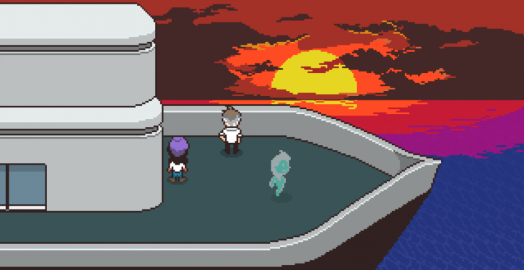
The dead coming back from beyond the grave is a familiar theme at this point. Whether rising as a zombie (a recent favorite, it seems), reviving as a vampire, or returning as an incorporeal ghost, death seems to be less and less of an impediment in fiction. The deceased can come back for a variety of reasons, but the most common tends to be revenge. Patrick McGrath’s Why Am I Dead At Sea is a follow-up to his freeware game Why Am I Dead, and is something of a twist on this age-old story. The ghostly protagonist has no idea who killed him/her – in fact, s/he isn’t even aware of who s/he is (or was). Solving these mysteries is the core of the game, using a combination of ghostly powers and good old-fashioned sleuthing. It’s clever, but it does require a lot of patience and conversation retreading, and even if you find all the clues, piecing them together at the end is anything but intuitive.
Why Am I Dead (still available to play online) is a short but fun mystery with a nearly identical premise of playing a ghost trying to solve his own murder. The biggest difference is that you start right next to your corpse, so figuring out your own identity is much easier. You immediately possess the nearest living person, who also seems to want to find your killer. While this Flash game uses a very similar, if simplified, playing style as the sequel, the actual ghostly abilities confused me. I could possess someone, but they would talk to people with knowledge only they could have. So was I truly “possessing” them, or simply along for the ride? This became even more confounding when I possessed an old lady and made her act wildly out of character and say things only I had knowledge of. For that matter, how did I even come back as a ghost in the first place? Is this something that happens to all murder victims?
Evidently realizing he’d left a lot of discrepancies and questions unanswered the first time around, McGrath created Why Am I Dead At Sea with no such vagueness. After a brief visit to the void, you are brought back to the world of the living by Paulo, a young boy with psychic abilities even he doesn’t fully understand. Paulo has had a premonition of horrible things to come on the cruise ship he’s travelling on. Being a young boy travelling alone, whom nobody would take seriously, he needs your help to get to the bottom of the danger, and figuring out who you are and who killed you seems like a natural place to start. Paulo is able to give you a brief tutorial on your ghostly gifts, including how to jump into people’s bodies and manipulate their actions.
At the beginning of the game, your blue flame-like specter is only able to possess Alton, the ship’s good-hearted but naïve DJ. Alton has a crush on Xu (who everyone calls Sue), the vessel’s waitress. Xu needs help finding out who broke into her cabin the night before, so the two of them talk to the ship’s crew and passengers, none the wiser that you're guiding their investigation. There aren’t many people on this cruise, so it’s an effective way to introduce you to all the suspects. There’s the quiet but insightful writer Quella, the leather jacket-wearing and suspiciously aggressive Donovan, and the disturbingly upbeat first mate Ferdinand, to name just a few. You won’t have to travel far to meet them all either, as the ship is strangely small for a cruise. Besides everyone’s cabins, there’s only a restaurant, an observation lounge, a utility closet, and the bridge to explore. Solving Xu’s little mystery only raises further questions and sets the tone of the game. The murderer is far from the only person with secrets on board.
Why Am I Dead At Sea has a somewhat whimsical low-res visual design that belies its dark storyline. The graphics look akin to the early Nintendo eras and reminded me more than a bit of the cult RPG Earthbound with its semi-overhead view and blocky pixels. McGrath uses the style well, however. All of the characters have a unique look, from Alton’s bright green headphones to Quella’s purple headscarf. The sound has a tinny, mechanical quality that also evokes memories of Super Nintendo RPGs, but the developer takes it one clever step further, giving most characters their own theme music when you possess them. Quella’s is an upbeat mix filled with fun and quirkiness, while the white-haired businessman Garv has a more downbeat and slightly melancholy accompaniment. There is no voice acting, but the game has the familiar trill sound when characters speak, the pitch and style changing from character to character. The images you see when you read people’s minds are also unique and often psychedelic, such as an hourglass in Quella’s mind and a face of absolute rage in Donovan’s. The minimalist presentation in no way impedes the individuality of the characters.
Paulo does a pretty good job at explaining the keyboard controls, but the setup isn’t the most intuitive by default, involving an odd combination of action keys to go with the WASD or arrow keys to move in the four cardinal directions. Fortunately, you can customize the key bindings to something you prefer. In keeping with its SNES feel, I found my USB controller to be a much smoother way of playing, though one is hardly necessary. The only time I got confused was later in the game when I didn't realize I had to hold the possession button down longer to "fully possess" someone. I don't know if Paulo just didn't explain it fully or if I missed a critical instructional sentence.
The gameplay mechanics of Why Am I Dead At Sea are much more polished than its predecessor. Being a ghostly possessor has some pretty strict rules, it seems. First of all, you can’t jump into just anybody. The host either needs to be a fairly open (and weak-willed) person to begin with, or you need to have pieced together enough information about what makes them tick to make them vulnerable to you. This often involves talking to them with the right person to get them to open up about themselves, though you’ll have to unlock the person they’ll trust before you can do that. Occasionally you can learn what you need about people another way, such as sneaking into their cabin. A weak possession will only let you “nudge” a character in the direction you want. In essence, you’ll be able to move them around and control them, but they’ll only talk using information they themselves know, and they won’t act out of character. Learn even more about a person, and eventually you’ll be able to fully possess them, allowing you more freedom to use them however you see fit. At a certain point you’ll also be able to read their thoughts, which provide clues to what’s going on with them, but only in vague sentences. You’ll need more solid info than that to deduce what’s going on.
Each character also has a special ability you can use when you possess them. Some of these are cosmetic, such as Alton’s ability to change the music the game is playing. Others are somewhat helpful, such as Xu’s ability to see what someone has in their pockets. And still others are very useful, such as Quella’s ability to read the emotions of people while talking to them as effectively as Star Trek’s Counselor Troi. These abilities are rarely, if ever, vital to solving the mystery, but several of them help steer you in the right direction and all of them give their respective characters a little extra bit of unique distinction.
If this is starting to sound complicated, that’s because it is. Most progress is made by talking to the right person with the other right person. This is fairly simple towards the beginning of the game, when you can only jump into one or two people (and a cat), but as the investigation progresses and your options increase it becomes much more difficult to find the right combination, and much harder to remember who you’ve already talked to as whom. This is made even more complex when you gain the ability to fully possess someone. Paulo is able to give you some decent hints if you ask him, which is nice when you get a little stuck, but this hint system disappears in the later stages of the game when you truly need it the most. Much like a brute-force inventory solution, I found myself running around talking to random people as random people just to find that one more clue I needed to proceed.
Solving the mystery itself is further complicated by the finale. I don’t want to spoil anything, but after about 3-4 hours of play time, you’ll have to possess people to give certain bits of info to lead the group to the correct conclusion. The problem is that the game gives you very limited time to deduce the best way to go about this. Even if you know the whole story (and it’s far from simple), knowing who to possess and what to say in what order isn’t intuitive at all. I managed to get three or four different endings, but I’m pretty sure I never got the “true” ending. Unfortunately, replaying this scene is frustrating because it’s preceded by some unskippable dialogue and action, meaning it will take you several minutes from your last save to give it another go. It’s certainly a tense conclusion to the story, but the strict parameters of the puzzle made it a somewhat unsatisfying one for me as well.
Why Am I Dead At Sea isn’t the first game to feature a ghost trying to solve their own death with ghostly powers, but it still manages to stand out. The complex central mystery is never predictable or boring, and though the "puzzles" are all dialogue-based and might be a little frustrating from time to time, they’re nevertheless quite logical and fairly unique. The characters look like sprites from a bygone decade, yet they still manage to display a fair bit of personality. And while the finale frustrated me a little, some will surely welcome the additional challenge and the multiple endings offer incentive to replay the sequence for more. If you like mysteries, are in the mood for something a little different, and don’t mind a game that’s mostly reading dialogue, there's a lot to enjoy in this indie title. In an industry where large studios can use dozens of people to churn out games that still manage to disappoint, it’s refreshing to see what an incredibly small but talented group like this one can do.




